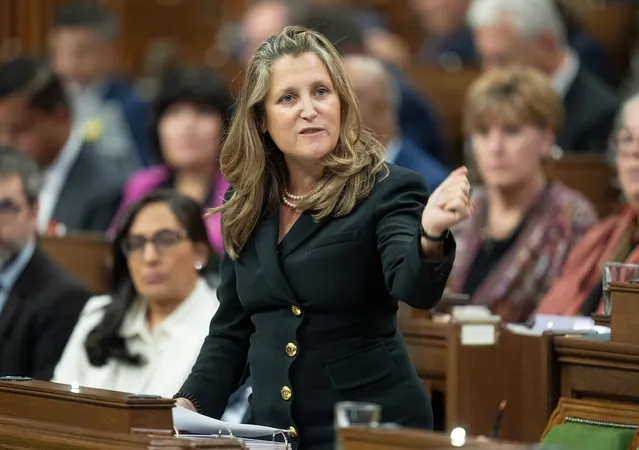
Canadians Split Over Federal Spending: A Generational Clash Unfolds
2024-10-05
As the Canadian government gears up for a crucial fall economic update, a recent poll reveals a striking generational divide on the issue of new federal spending. More than a quarter of Canadians believe that no new financial allocations should be made at all, presenting a complex landscape for Finance Minister Chrystia Freeland as she navigates this politically charged environment.
Freeland's team is actively preparing for the fall economic update, although details regarding the release date remain under wraps. The significance of this update is amplified this year due to the impending instability within the minority Parliament, especially since the New Democratic Party (NDP) has withdrawn its guarantee of automatic support for the Liberal government's confidence votes. This shift raises the stakes significantly for the upcoming economic discourse.
The Nanos Research survey asked Canadians which age group should be prioritized in any new spending initiatives following the fall update. Survey participants had the option to choose from four age groups, along with responses indicating either support for the absence of new spending or expressing uncertainty. The findings were revealing: 26% of Canadians advocated for no new spending at all. Tied for the second most popular opinion were young Canadians aged 18 to 34 and older Canadians aged 55 and older, each receiving 19%. Only 13% opted for middle-aged Canadians aged 35 to 54, while another 10% felt children aged 18 and under should be prioritized. Notably, 13% remained uncertain about where spending should go.
Nik Nanos, chief data scientist at Nanos Research, noted the underlying generational conflict reflected in the survey's results. A striking 30% of respondents aged 55 and older believe there should be no new spending, compared to only 15% of younger Canadians. "The most compelling takeaway from this survey is that nearly one-quarter of Canadians don't want to see any new expenses incurred," he commented.
The survey encompassed 1,058 Canadian adults and was conducted between Sept. 29 and Oct. 2, with a margin of error of plus or minus three percentage points. Economically focused questions from this survey were commissioned by The Globe and Mail.
Political dynamics further complicate the landscape, as the Bloc Québécois has indicated a willingness to support the Liberals on pivotal votes if specific financial measures are enacted. They are particularly advocating for bill C-319, which would propose a 10% increase in benefits for seniors aged 65 to 74.
However, the Liberal government fired back against this demand, recently voting against a motion that would enable the Bloc's proposed bill, despite it garnering support from Conservative, NDP, and Green Party Members of Parliament.
In a parallel survey question commissioned by CTV News, over three-quarters of respondents expressed either support (55%) or mild support (24%) for increasing benefits for seniors aged 65 to 74. Nanos pointed out that while there's general support for enhancing Old Age Security (OAS) benefits, perspectives on overall spending priorities are sharply divided along generational lines. "This isn't just about policy; it's about political power plays," he added.
Current polling suggests the Conservative Party holds a slight edge over the Liberals in terms of public trust regarding economic growth, with 38% of respondents leaning towards the Conservatives compared to 37% for the Liberals. For matters concerning the middle class, trust levels are more competitive: 29% favor Conservatives, while 24% back Liberals and 20% support the NDP.
Discussions surrounding priorities for affordable housing show a similarly close race, where 24% trust Conservatives, 23% favor the NDP, and Liberals trail with 17%. Interestingly, 21% of respondents reported feeling distrust towards all major parties on this issue.
As the political climate evolves, one thing is clear: the debate over federal spending in Canada isn't just about economics; it's a nuanced conversation steeped in generational perspectives and differing priorities, with the potential for significant ramifications as the government moves forward into the fall.









 Brasil (PT)
Brasil (PT)
 Canada (EN)
Canada (EN)
 Chile (ES)
Chile (ES)
 España (ES)
España (ES)
 France (FR)
France (FR)
 Hong Kong (EN)
Hong Kong (EN)
 Italia (IT)
Italia (IT)
 日本 (JA)
日本 (JA)
 Magyarország (HU)
Magyarország (HU)
 Norge (NO)
Norge (NO)
 Polska (PL)
Polska (PL)
 Schweiz (DE)
Schweiz (DE)
 Singapore (EN)
Singapore (EN)
 Sverige (SV)
Sverige (SV)
 Suomi (FI)
Suomi (FI)
 Türkiye (TR)
Türkiye (TR)